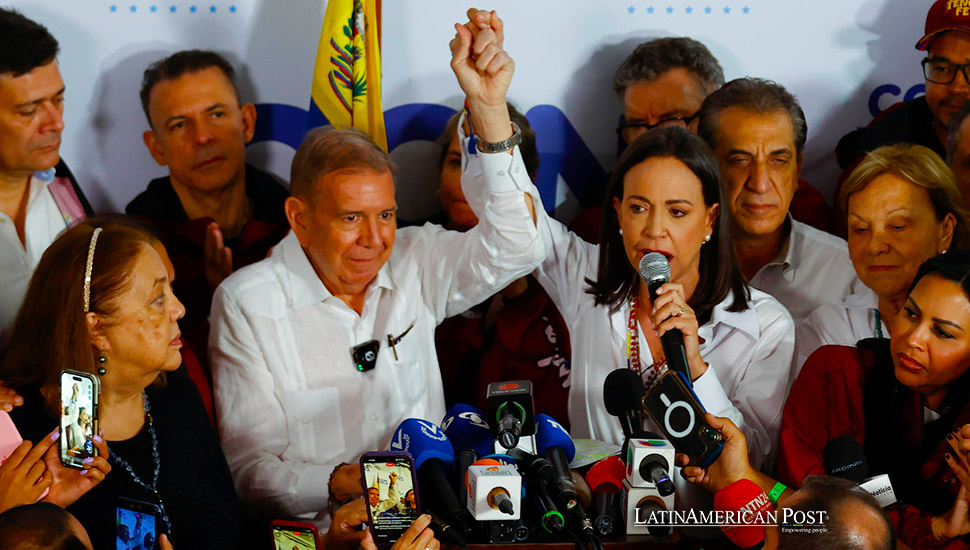U.S. Acknowledges González as Victor in Venezuela’s Presidential Race

Venezuela’s electoral authority faces intense scrutiny after the U.S. recognized opposition candidate Edmundo González as the rightful winner of the presidential election, challenging the declared victory of President Nicolás Maduro.
The stakes have risen dramatically for Venezuela’s electoral authority to provide proof supporting its decision to declare President Nicolás Maduro the winner of the recent presidential election. The United States added to the pressure on Thursday by recognizing opposition candidate Edmundo González as the true victor, casting doubt on the official results of this highly anticipated vote.
The U.S. Department of State’s announcement came after calls from various governments, including some of Maduro’s allies, for Venezuela’s National Electoral Council to release detailed vote counts. These tallies were made public in previous elections, adding credibility to the electoral process. The electoral body declared Maduro the winner on Monday. Still, the main opposition coalition quickly countered, revealing evidence that González had won, based on more than two-thirds of the tally sheets printed by electronic voting machines after polls closed.
“Given the overwhelming evidence, it is clear to the United States and, most importantly, to the Venezuelan people that Edmundo González Urrutia won the most votes in Venezuela’s July 28 presidential election,” said U.S. Secretary of State Antony Blinken.
The U.S. announcement occurred amid diplomatic efforts to persuade Maduro to release the vote tallies and increasing calls for an independent review of the results. Brazil, Colombia, and Mexico officials have constantly communicated with Maduro’s administration, urging transparency. They emphasized that revealing the data is essential to dispel doubts about the election results.
Regional and International Reactions
Mexican President Andrés Manuel López Obrador indicated his intent to discuss the situation with Brazilian President Luiz Inácio Lula da Silva and Colombian President Gustavo Petro. His administration stressed the importance of making the electoral tallies public. Subsequently, Brazil, Colombia, and Mexico issued a joint statement urging Venezuela’s electoral authorities to release detailed voting data expeditiously. They emphasized that the principle of popular sovereignty must be respected through impartial verification of the results.
Following the National Electoral Council’s declaration of Maduro’s victory, thousands of opposition supporters took to the streets. The government reported hundreds of arrests, and the Venezuela-based human rights organization Foro Penal stated that 11 people were killed during the protests. Dozens more were detained the next day, including former opposition candidate Freddy Superlano.
Opposition leaders Maria Corina Machado and Edmundo González addressed a large rally in Caracas but remained out of public view. Machado, who was barred from running for president, later wrote in an op-ed for the Wall Street Journal that she was hiding, fearing for her life and freedom. She reiterated that the opposition has evidence of Maduro’s electoral defeat and called for international intervention.
In response to the controversy, Maduro asked Venezuela’s highest court to audit the election. This move was met with skepticism, as the Supreme Tribunal of Justice is closely aligned with Maduro’s government. The court’s justices are nominated by federal officials and ratified by the National Assembly, dominated by Maduro sympathizers. Despite criticism, the court accepted Maduro’s request and ordered him, González, and the other candidates to appear before the justices.
González and Machado claim to possess over two-thirds of the tally sheets from the electronic voting machines, which they believe would prove Maduro’s defeat if released. However, Maduro attributed the delay in releasing detailed vote counts to cyber-attacks on the National Electoral Council without providing specifics.
Brazil, Colombia, and Mexico, all close allies of Venezuela, have urged Maduro to release the detailed vote counts. These countries emphasize that transparency is crucial for promoting dialogue among Venezuelan stakeholders to resolve the disputed election. Mexican President López Obrador expressed hope that the will of the Venezuelan people would be respected and called for the presentation of electoral results records.
The Economic and Social Backdrop
Venezuela’s political turmoil is set against a backdrop of severe economic decline. Once the wealthiest country in South America, Venezuela has faced a dramatic downturn since Maduro assumed power in 2013. Plummeting oil prices, widespread shortages, and hyperinflation, which at one point exceeded 130,000%, have led to social unrest and mass emigration.
More than 7.7 million Venezuelans have fled the country since 2014, marking the most significant departure in recent Latin American history. The economic hardship has created a dire situation for those remaining in Venezuela. While the bolívar remains the official currency, the economy increasingly relies on U.S. dollars, creating a two-tier system. This dollarization has somewhat stabilized the economy but has also deepened social inequalities.
High-end shops and restaurants in Caracas are bustling, fueled by U.S. dollars, while those without access to dollars struggle. This divide was starkly highlighted by the recent concerts of Colombian reggaeton superstar Karol G in Caracas. Despite high ticket prices, the events sold out, illustrating the growing economic disparity.
The recent presidential election in Venezuela has intensified scrutiny of the country’s electoral processes and heightened international calls for transparency. With the U.S. recognizing opposition candidate Edmundo González as the winner, the pressure on President Nicolás Maduro and the National Electoral Council to release detailed vote counts has escalated. The outcome of this dispute will significantly impact Venezuela’s political and economic future.
Also read: New Sanctions on Venezuela: A Necessary Step for Global Accountability
As the international community watches closely, the unfolding events in Venezuela underscore the importance of credible and transparent electoral processes in maintaining democratic principles. The situation remains fluid, with ongoing diplomatic efforts to ensure a resolution that respects the will of the Venezuelan people.




